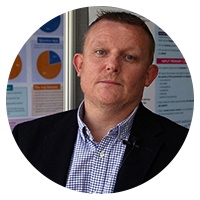Five Year Forward View, Working at Scale
Working At Scale, Supported by RCGP
Dr Mike Holmes is a Yorkshire-based GP, leads the GP at scale programme (since 2015) and is the recently elected Vice Chair at the RCGP.
We spoke to him to understand his ‘working at scale’ journey since 2002, from overcoming the challenges at practice level as a partner at Haxby Group to working with multiple practices at a Federation level as Chair of Nimbuscare Ltd in York. We also discussed how he is supporting GP providers across the country to implement their own ‘at scale’ vision with the RCGP.
Why working at scale is important
Working at scale is an opportunity to be innovative and creative about how we manage patient demand and workload. It allows us to:- look at the benefits of working with a multi-professional healthcare team
- develop innovative systems that help manage the decision density, thus creating headspace for GPs
- provide an improved experience for patients
Working at scale includes technology use, e.g. online access to medical records and test results. It enables processes to be more efficient, which can be magnified in larger organisations. Efficiency at scale also means cost savings through the use of shared back office services, including dedicated HR, finance and business intelligence. As a whole, it is multifaceted with benefits on many fronts.
Working at scale doesn’t mean that patients lose their local surgery or relationships. It’s important to maintain the local feel. Care and access can be navigated so that patients still see the GP of their choice in their local surgery, whilst experiencing a leaner and more efficient service.
Working at scale in Yorkshire
“We recognised that, if we were to protect ourselves from the challenges we face, then growing and diversifying was quite important. We have gone through a number of experiences where we grew through bids for APMS contracts, mergers, and exploration of new sectors. Our goal was to grow, but also do it with an ethical footing, by focusing on patient needs and user experience.“Growth happened on the background of a stable practice and a clear culture. A delegated management function has helped support the growth, and we have invested in multiprofessional teams to enhance GP wellbeing. There are always areas to be improved and we certainly don’t always get it right, but it feels like we are moving in a good direction.
Mike is now involved in developing a Primary Care Home, which brings together a range of health and social care professionals to provide enhanced personalised and preventative care for their local community.
It’s an open collaboration with general practice in York and he hopes to have further cross-sector collaboration in the city of 250,000 population; using the Primary Care Home model they are considering the population in 6 areas of 30-50,000 people. They are currently looking at health outcomes data to see how they might plan services to best meet the needs of the population.
In Hull there is a slightly different approach but still building on scale and collaboration. Haxby Group is involved in a collaborative with 8 practices collectively caring for around 80,000 patients. There are 5 different collaborations of practices across the city each looking to deliver care collaboratively and exploring how to work together where possible.
“We are seeing at scale working at different sizes; at the practice level, populations of 30-50k and the whole of the city. It feels like we’re going in the right direction. Its early days, but it already feels positive.”
Multiprofessional Teams
Working with clinicians in a multi-professional team has been embraced in his practice.“Working with pharmacists, physiotherapists, paramedics, nurse practitioners, mental health workers and other professionals to deliver care to patients and support GPs as part of a multiprofessional team is becoming a reality. Task substitution is a way to manage workload in a safe way. We are seeing longer routine consultation times and a focus on clinician wellbeing.
“Workforce transformation and development seems really important right across the country but particularly in under-doctored areas; “figures show that the north and northeast really struggle to recruit GP Trainees. The fill rates for the training schemes are lower than the rest of the country. We recognise there's a workforce challenge, but there’s also an uneven geographical distribution, so perhaps we've had to evolve a bit quicker.”
RCGP and working at scale
The RCGP programme goal is to “support practices to work in the current environment and navigate the current challenges; to support General Practice to evolve if you like”.
“What attracted me to lead the ‘GP at scale programme’ was its non-prescriptive approach to support practices to engage with scale in the way that best suited their needs. The programme provided access to resources and experiences from those working at scale.
“It’s felt like a really productive environment within the RCGP and I’m proud to have been elected Vice Chair earlier this year and looking forward to doing more to improve the experience of our members, supporting them as best we can to deliver General Practice throughout the UK.”
There is a huge recognition that it takes time to create effective collaborations:
“Building trust and relationships between GPs, practices and different sectors is critical if you are to real progress. Investing time and resources in order to do this is really important.”
The RCGP at Scale programme is focusing on building local communities to support GPs to work at scale working alongside NHS Collaborate in doing so.
Additional support from the RCGP
The General Practice At Scale Online Learning Network seeks to provide information and support around general practice working at scale, by connecting GPs with each other to share learning. There is also a quality and efficiency arm to the work designed to support organisations find an approach to quality improvement.
RCGP has also hosted regional meetings, ran webinars and held educational events to hear and share experiences from those on the ground working at scale.
The RCGP Annual Conference is being held from the 4-6 October in Glasgow this year and will be a fantastic forum to talk about the challenges we face in General Practice and how the profession can evolve to meet them. Working at Scale now seems to be a feature of General Practice in all 4 Nations of the UK – the question to be considered is “How can working at scale support the delivery care to patients in the area where you practice?”
Dr Mike Holmes BSc MB ChB MSc DRCOG FRCGP Mike is a GP in Yorkshire and Vice Chair of the Royal College of GPs, with responsibility for Membership, English Faculties and the International Work of the College.
Mike is a GP in Yorkshire and Vice Chair of the Royal College of GPs, with responsibility for Membership, English Faculties and the International Work of the College.
He has been a Partner with Haxby Group since 2002, caring for 50,000 patients in the cities of York and Hull.
Mike is Chair of Nimbus Care Ltd, caring for 150,000 patients in York and is working with all the practices in the city to develop a Primary Care Home model of care.
Mike is a board member of the North of England LETB and leads development of Advanced Clinical Practitioners across Humber, Coast and Vale STP.


